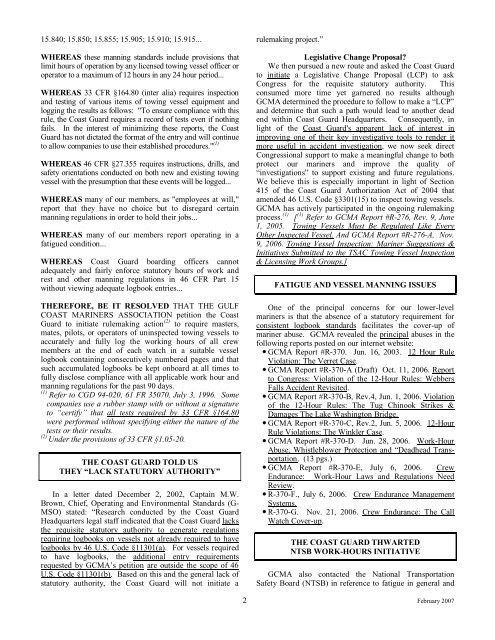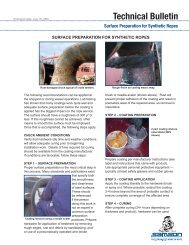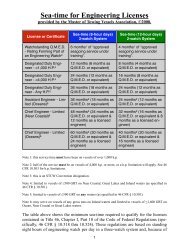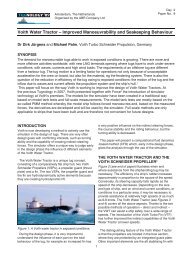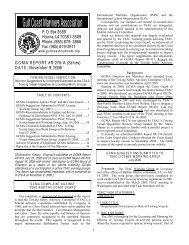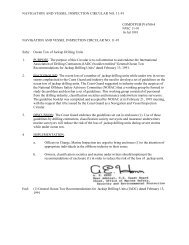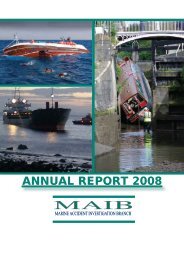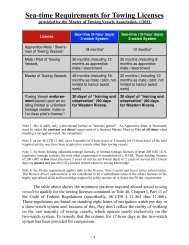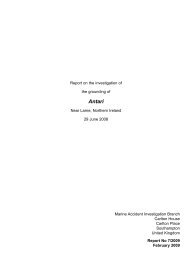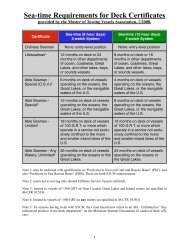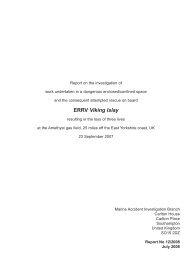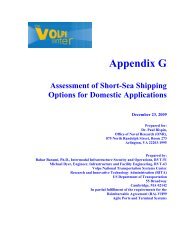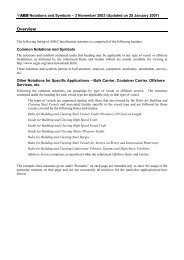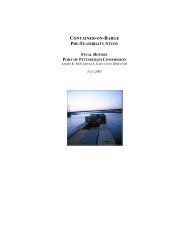R-429-G, Rev. 2 - Towmasters: the Master of Towing Vessels Assoc ...
R-429-G, Rev. 2 - Towmasters: the Master of Towing Vessels Assoc ...
R-429-G, Rev. 2 - Towmasters: the Master of Towing Vessels Assoc ...
You also want an ePaper? Increase the reach of your titles
YUMPU automatically turns print PDFs into web optimized ePapers that Google loves.
15.840; 15.850; 15.855; 15.905; 15.910; 15.915...WHEREAS <strong>the</strong>se manning standards include provisions thatlimit hours <strong>of</strong> operation by any licensed towing vessel <strong>of</strong>ficer oroperator to a maximum <strong>of</strong> 12 hours in any 24 hour period...WHEREAS 33 CFR §164.80 (inter alia) requires inspectionand testing <strong>of</strong> various items <strong>of</strong> towing vessel equipment andlogging <strong>the</strong> results as follows: "To ensure compliance with thisrule, <strong>the</strong> Coast Guard requires a record <strong>of</strong> tests even if nothingfails. In <strong>the</strong> interest <strong>of</strong> minimizing <strong>the</strong>se reports, <strong>the</strong> CoastGuard has not dictated <strong>the</strong> format <strong>of</strong> <strong>the</strong> entry and will continueto allow companies to use <strong>the</strong>ir established procedures." (1)WHEREAS 46 CFR §27.355 requires instructions, drills, andsafety orientations conducted on both new and existing towingvessel with <strong>the</strong> presumption that <strong>the</strong>se events will be logged...WHEREAS many <strong>of</strong> our members, as "employees at will,"report that <strong>the</strong>y have no choice but to disregard certainmanning regulations in order to hold <strong>the</strong>ir jobs...WHEREAS many <strong>of</strong> our members report operating in afatigued condition...WHEREAS Coast Guard boarding <strong>of</strong>ficers cannotadequately and fairly enforce statutory hours <strong>of</strong> work andrest and o<strong>the</strong>r manning regulations in 46 CFR Part 15without viewing adequate logbook entries...THEREFORE, BE IT RESOLVED THAT THE GULFCOAST MARINERS ASSOCIATION petition <strong>the</strong> CoastGuard to initiate rulemaking action (2) to require masters,mates, pilots, or operators <strong>of</strong> uninspected towing vessels toaccurately and fully log <strong>the</strong> working hours <strong>of</strong> all crewmembers at <strong>the</strong> end <strong>of</strong> each watch in a suitable vessellogbook containing consecutively numbered pages and thatsuch accumulated logbooks be kept onboard at all times t<strong>of</strong>ully disclose compliance with all applicable work hour andmanning regulations for <strong>the</strong> past 90 days.(1)Refer to CGD 94-020, 61 FR 35070, July 3, 1996. Somecompanies use a rubber stamp with or without a signatureto “certify” that all tests required by 33 CFR §164.80were performed without specifying ei<strong>the</strong>r <strong>the</strong> nature <strong>of</strong> <strong>the</strong>tests or <strong>the</strong>ir results.(2)Under <strong>the</strong> provisions <strong>of</strong> 33 CFR §1.05-20.THE COAST GUARD TOLD USTHEY “LACK STATUTORY AUTHORITY”In a letter dated December 2, 2002, Captain M.W.Brown, Chief, Operating and Environmental Standards (G-MSO) stated: Research conducted by <strong>the</strong> Coast GuardHeadquarters legal staff indicated that <strong>the</strong> Coast Guard lacks<strong>the</strong> requisite statutory authority to generate regulationsrequiring logbooks on vessels not already required to havelogbooks by 46 U.S. Code §11301(a). For vessels requiredto have logbooks, <strong>the</strong> additional entry requirementsrequested by GCMAs petition are outside <strong>the</strong> scope <strong>of</strong> 46U.S. Code §11301(b). Based on this and <strong>the</strong> general lack <strong>of</strong>statutory authority, <strong>the</strong> Coast Guard will not initiate arulemaking project.Legislative Change Proposal?We <strong>the</strong>n pursued a new route and asked <strong>the</strong> Coast Guardto initiate a Legislative Change Proposal (LCP) to askCongress for <strong>the</strong> requisite statutory authority. Thisconsumed more time yet garnered no results althoughGCMA determined <strong>the</strong> procedure to follow to make a LCPand determine that such a path would lead to ano<strong>the</strong>r deadend within Coast Guard Headquarters. Consequently, inlight <strong>of</strong> <strong>the</strong> Coast Guard's apparent lack <strong>of</strong> interest inimproving one <strong>of</strong> <strong>the</strong>ir key investigative tools to render itmore useful in accident investigation, we now seek directCongressional support to make a meaningful change to bothprotect our mariners and improve <strong>the</strong> quality <strong>of</strong>investigations to support existing and future regulations.We believe this is especially important in light <strong>of</strong> Section415 <strong>of</strong> <strong>the</strong> Coast Guard Authorization Act <strong>of</strong> 2004 thatamended 46 U.S. Code §3301(15) to inspect towing vessels.GCMA has actively participated in <strong>the</strong> ongoing rulemakingprocess. (1) [ (1) Refer to GCMA Report #R-276, <strong>Rev</strong>. 9, June1, 2005. <strong>Towing</strong> <strong>Vessels</strong> Must Be Regulated Like EveryO<strong>the</strong>r Inspected Vessel. And GCMA Report #R-276-A, Nov.9, 2006. <strong>Towing</strong> Vessel Inspection: Mariner Suggestions &Initiatives Submitted to <strong>the</strong> TSAC <strong>Towing</strong> Vessel Inspection& Licensing Work Groups.]FATIGUE AND VESSEL MANNING ISSUESOne <strong>of</strong> <strong>the</strong> principal concerns for our lower-levelmariners is that <strong>the</strong> absence <strong>of</strong> a statutory requirement forconsistent logbook standards facilitates <strong>the</strong> cover-up <strong>of</strong>mariner abuse. GCMA revealed <strong>the</strong> principal abuses in <strong>the</strong>following reports posted on our internet website:— GCMA Report #R-370. Jun. 16, 2003. 12 Hour RuleViolation: The Verret Case.— GCMA Report #R-370-A (Draft) Oct. 11, 2006. Reportto Congress: Violation <strong>of</strong> <strong>the</strong> 12-Hour Rules: WebbersFalls Accident <strong>Rev</strong>isited.— GCMA Report #R-370-B, <strong>Rev</strong>.4, Jun. 1, 2006. Violation<strong>of</strong> <strong>the</strong> 12-Hour Rules: The Tug Chinook Strikes &Damages The Lake Washington Bridge.— GCMA Report #R-370-C, <strong>Rev</strong>.2, Jun. 5, 2006. 12-HourRule Violations: The Winkler Case.— GCMA Report #R-370-D. Jun. 28, 2006. Work-HourAbuse, Whistleblower Protection and Deadhead Transportation.(13 pgs.)— GCMA Report #R-370-E, July 6, 2006. CrewEndurance: Work-Hour Laws and Regulations Need<strong>Rev</strong>iew.— R-370-F., July 6, 2006. Crew Endurance ManagementSystems.— R-370-G. Nov. 21, 2006. Crew Endurance: The CallWatch Cover-up.THE COAST GUARD THWARTEDNTSB WORK-HOURS INITIATIVEGCMA also contacted <strong>the</strong> National TransportationSafety Board (NTSB) in reference to fatigue in general and2 February 2007


